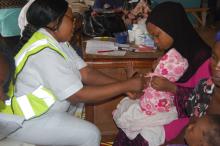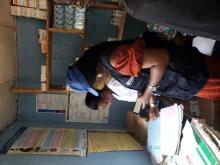Driving levers of change for improved immunization coverage in weak performing LGAs
Abuja, 8 August, 2019 - The World Health Organization (WHO) is currently providing guidance to intensifying Routine Immunization (RI) strategies in low performing Local Government Areas (LGAs) in priority States in Nigeria.
Strengthening of RI at the LGAs is acknowledged as a critical foundation for achieving Primary Health Care (PHC) objectives as well as Universal Health Coverage (UHC). The lack or inadequacies of strategies to improve RI in LGAs implies children cannot be reached with vaccines, thus, exposing the children to outbreaks of vaccine preventable diseases including consequences of illnesses and even deaths that can be prevented.
In an effort to strengthen RI, Optimized Integrated Routine Immunization Sessions (OIRIS) visits were conducted during the period under review and six (6) rounds were conducted in all the 18 low performing States. Each of States received Two (2) rounds of visits from the National Team. The visit has four key objectives; to assess quality of technical plans of the State teams, identify and resolve operational needs for implementation of plans, advocacy for support and political commitment to sustain gains and monitor the administration of the accountability framework including data visibility.
“We are unhappy to be counted among LGAs that have not shown progress in RI and we will do our best to use the lessons from this engagement meeting to ensure that we are not counted among the low performing LGAs in the next RI-LQAS” says Nasiru Aliyu; Director of PHC Anka LGA, Zamfara.
The engagement of low performing LGAs is a process whereby the management team of the LGAs have direct contact with national experts to review strategies and develop result oriented action plans. It entails orientation of the OIRIS approach that address how to increase number of sessions, ensuring community engagement, integration of services, accurate reporting and use of data, institutionalization of regular supportive supervision and implementation of accountability framework.
The LGAs are also taken through problem solving tools to identify root causes and develop strategies to resolving the problems. In addition, there is a face-to-face session where the LGA teams are able to share sensitive details about barriers to implementation of their plans for which national interventions are required.
The direct engagement with LGAs, which was done in clusters, witnessed participation of over 800 managers and technical staff of Government. This included Senior Managers of the States hosting the low performing LGAs, the Directors at the LGAs, Immunization Officers, Cold Chain Officers, Health Educators and Data Officers.
The Routine Immunization Lots Quality Assurance Sampling (RI-LQAS) has been adopted by the country to assess the quality of RI at the second administrative level, LGAs. The quarterly RI-LQAS that started in fourth quarter of 2017 show that some LGAs are seriously lagging behind in improving RI.
Dr Bassey Okposen Bassey, the Program Manager of National Emergency Routine Immunization Coordination Centre (NERICC) said “the leadership of National Primary Healthcare Development Agency (NPHCDA) and NERICC remain focused on ensuring that all children in every settlement of this country are reached with vaccine. Each State in the 18 priority States are being monitored, and in each State there are LGA desks that also provide direct support to all LGAs”.
He added that the “engagement of the low performing LGAs is an intervention necessary to ensure that LGAs that are lagging behind are supported and guided in reviewing and implementing their plans for coverage improvement”.
Dr Kofi Boateng, of WHO Nigeria said, “The engagement of low performing LGAs have shown remarkable results. The two rounds of engagement have been conducted in December 2018 and May 2019 and the recent RI-LQAS results showed that of 46 out of 105 LGAs engaged in 2018 and 11 of 43 LGAs engaged in 2019 passed the RI-LQAS.”
He added that “this shows a decline in the number of children likely to be unimmunized in these LGAs, he added. We acknowledge the contribution of partners and funding from Gavi.”
Technical Contact:
Dr Richard Banda; Email: Bandari [at] who.int; Tel: +234 803 888 8269
Ms Chiaka Orjiako; Email: orjiakoc [at] who.int; Tel: +234 810 447 5698





